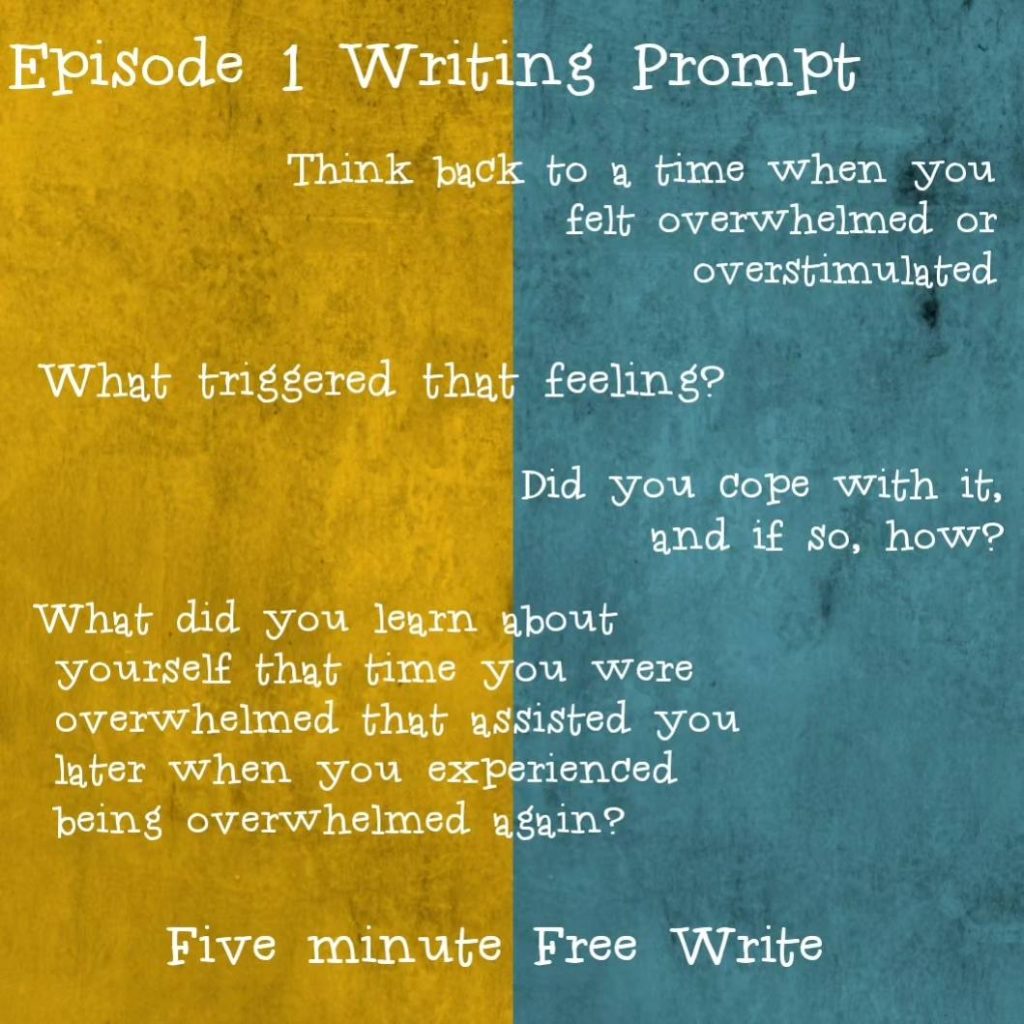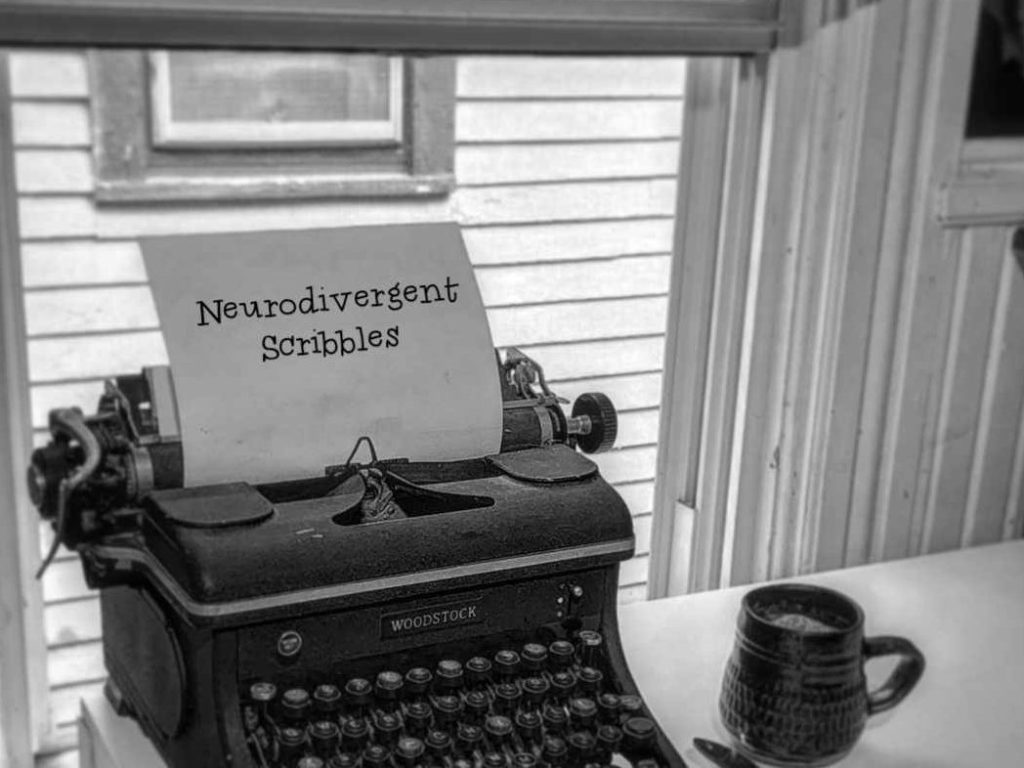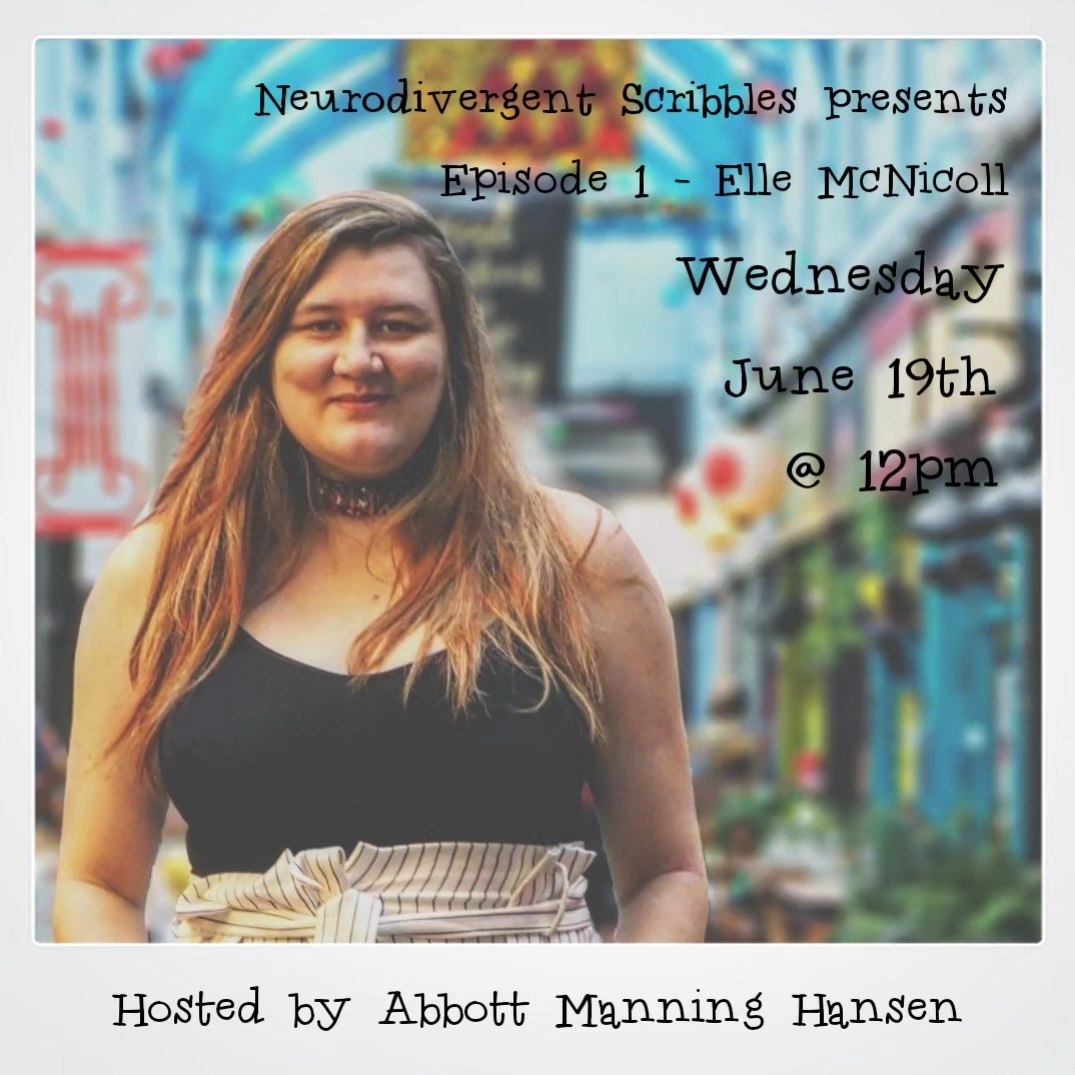https://ellemcnicoll.com
X(Formerly Twitter) – @booksandchokers
Instagram – @ellemcnicollofficial
Tik Tok – @ellemcnicoll
Author photo courtesy of https://scottishbooksinternational.org/elle-mcnicoll/
Transcript
Welcome to Neurodivergent Scribbles – A writing podcast curated for neurodivergent people, by neurodivergent people. Today is Wednesday, June 19th, 2024. I’m your host, Abbott Manning Hansen.
Today’s featured writer is Scottish author, Elle McNicoll.
Elle McNicoll is a bestselling and award-winning novelist and screenwriter. Her work has garnered her a Blue Peter Book Award, Overall Waterstones Children’s Book Prize, Blackwell’s Book of 2020, the Schneider Award, and has been nominated for Week Junior Book Awards, the Astrid Lindgren Memorial Award, Carnegie not once but four times, and was shortlisted for Books Are My Bags Awards thrice, The Little Rebels Award twice, the Branford Boase Award once, and so much more. Her debut novel, A Kind Of Spark, was adapted into a television series of the same name, which got an Emmy nomination and won Best Children’s Programme at the Broadcast Awards in London this year.
Elle has spent her career advocating for neurodivergent writers within the writing and publishing industries her entire career, from creating neurodivergent characters to writing essays on neurodivergent coded characters in other media to spreading awareness through her various social media. Links to her different social media platforms will be left in the description for your viewing pleasure.
I did some digging on Elle before recording today’s episode, and I’m glad I did. Elle is a younger Millennial, so she’s well aware of how neurodivergent girls and assigned-female-at-birth(AFAB) individuals were treated. The 1990s was a terrible time for neurodivergent girls, because they weren’t seen as neurodivergent. Up to that point, almost all of the research done regarding neurodivergence was done primarily on boys, men, and other assigned-male-at-birth(AMAB) individuals. It wasn’t referred to as being neurodivergent until after 1998 in an article in The Atlantic by journalist Harvey Blume. And it didn’t reach popular culture until much later. So, neurodivergent girls were merely seen as “quirky”, “defiant,” or “insane,” and were punished when they didn’t present in a neurotypical manner that was acceptable by society’s standards, at the time. Even now, being autistic and writing about neurodivergent characters in her work and other works, she, her expertise, and her lived experiences are brought into question. And, as a neurodivergent writer and podcaster, I’m proud of her and her work as a neurodivergent writer, an advocate for neurodivergent writers, and walking so future neurodivergent writers can run.
The first in a wonderfully written series, A Kind Of Spark is the first published novel by this Scottish neurodivergent author. It tells the story of 11-year-old Addie as she campaigns for a memorial in memory of the witch trials that took place in her Scottish hometown. Addie knows there’s more to the story of these ‘witches’, just like there is more to hers. Can Addie challenge how the people in her town see her, and her autism, and make her voice heard? A story about friendship, courage and self-belief, perfect for fans of The Goldfish Boy. Readers have said, “A Kind of Spark is an incredibly touching and powerful book. The characters are well-drawn and while I would have liked for this book to be longer, it was shown that everyone had their own struggles and flaws,” “A stunning, moving and powerful book with a main character a lot of people – children and adults – should look up to,” and “A beautiful, heartfelt, lyrical and warm book about speaking up and being proud of who you are.”
Today’s excerpt is the first chapter of A Kind Of Spark. Let’s dive in, shall we?
Chapter 1
“This handwriting is utterly disgraceful.”
I hear the words, but they seem far away. As if they are being shouted through a wall. I continue to stare at the piece of paper in front of me. I can read it. I can make out every word, even through the blurriness of tears. I feel everyone in the classroom watching me. My best friend. Her new friend. The new girl. Some of the boys are laughing.
I just keep staring at my writing. Then, suddenly, it’s gone.
Ms. Murphy has snatched it from my desk and is now ripping it up. The sound of the paper being torn is overly loud. Right in my ears. The characters in the story I was writing beg her to stop, but she doesn’t. She crumples it all together and throws it toward the classroom bin. She misses. My story lies in a heap on the scratchy carpet.
“Do not ever write so lazily again!” she shouts.
Maybe she isn’t even shouting, but it feels that way. “Do you hear me, Adeline?” I prefer being called Addie. “Not ever. A girl your age knows better than to write like that; your handwriting is like a baby’s.”
I wish my sister were here. Keedie always explains the things that I cannot control or explain for myself. She makes sense of them. She understands.
“Tell me that you understand!”
Her shouts are so loud and the moments after are so quiet. I nod shakily. Even though I don’t understand. I just know it’s what I’m supposed to do.
She says nothing more. She moves to the front of the class and I am left alone. I can feel the new girl glancing at me, and my friend Jenna is whispering to her new friend, Emily.
We were supposed to have Mrs. Bright this year; we met her briefly before the summer holidays. She would draw a little sun with a smiling face beside her name and would hold your hand if you looked nervous. But she got sick and Ms. Murphy came to teach our class instead.
I thought this new school year would be better. That I would be better.
I take out my pocket thesaurus. It was a Christmas present from Keedie. She knows how much I love using different words, and we laughed because the word “thesaurus” sounds like a dinosaur. I read different word combinations to calm down, to process the shouting and the ripping.
I find a word that I like. “Diminished.” On days like this, I spend lunchtime in the library. I feel the other children in the class still watching me as we tuck in our chairs and leave the room, the school bell screeching so loudly. Loud noises make my head spin; they feel like a drill against a sensitive nerve. I walk through the corridors, practicing my breathing and keeping my eyes straight ahead. People talk so loudly to their friends, who are right next to them. They get too close, they push and clamor, and it makes my neck hot and my heart too quick.
But when I finally get to the library it’s all quiet. A good kind of quiet. There is so much space, and an open window lets in a little fresh air. There is no loud talking allowed. The books are all categorized and labeled in their proper places.
And Mr. Allison is at his desk. “Addie!”
He has curly dark hair and big glasses, and he is tall and skinny for a man. He wears old sweaters. If I were to use my thesaurus to describe Mr. Allison, I would say he is kindly.
But I like to just say that he is nice. Because he is. My brain is very visual. I see everything in specific pictures, and when people use the word “nice,” I think of Mr. Allison, the librarian.
“I have just the thing for you!”
I like that he never asks boring questions. He doesn’t ask how my holidays were or how my sisters are doing. He just gets straight to talking about books.
“Here we go.” He walks over to one of the reading tables and puts a large hardcover book down in front of me. I feel all the horrid feelings from earlier disappear.
“Sharks!”
I flip it open immediately and stroke the first glossy page. I told Mr. Allison last year that I love sharks. That they are the most interesting thing to me, even more than the ancient Egyptians and the dinosaurs.
He remembered.
“It’s a sort of encyclopedia,” he tells me, as I sit down with the book. “An encyclopedia is a book that tells you a lot about one subject, or one area of study. This one is all about sharks.”
I nod, somewhat dazed from excitement.
“I suspect you know everything that’s in there already, though,” he says, and he laughs after he says it so I know that he’s joking.
“Sharks don’t have bones,” I tell him, caressing the photograph of what I know is a blue shark. “And they have six senses. Not five. They can sort of sense electricity in the atmosphere. The electricity of life! They can also smell blood from miles away.”
Their senses are sometimes overpowering. Too loud, too strong, too much of everything.
I turn the page to a large photograph of a solitary Greenland shark, swimming alone in the ice-cold water.
“People don’t understand them.” I touch the shark’s fin. “They hate them, actually. A lot of people. They’re afraid of them and don’t understand them. So they try to hurt them.”
Mr. Allison doesn’t say anything for a while, as I read the first page.
“You take that home with you for as long as you like, Addie.”
I look up at him. He is smiling, but his eyes don’t match his mouth.
“Thank you!” I make sure to put all the glad that I am feeling into my voice so that he knows I really mean it. He moves back to his desk and I become engrossed in the book. Reading is the most calming thing after an overly loud and unkind classroom. I can take my time. There is no one rushing me or barking at me. The words all follow rules. The pictures are bright and alive. But they do not overpower me.
When I am trying to sleep at night, I like to imagine diving beneath the cold waves of the ocean and swimming with a shark. We explore abandoned shipwrecks, underwater caves, and coral reefs. All that color, but in a wide-open space. No crowds, no pushing, and no talking. I would not grab its dorsal fin. We would swim alongside one another.
And we would not have to speak a word. We could just be.
Adeline, or Addie as she prefers to be called, sits in class, completing an assignment given to her by her teacher, Ms. Murphy, who was an unexpected replacement for Mrs. Bright when she fell ill. Ms. Murphy is brash and impatient with Addie, disregarding the girl’s fawn response to being chastised. From a first person perspective, Addie walks us through how this interaction makes her feel, what happens in her mind as her teacher disrespects her work and insults her by making an infantile comparison. Once this interaction concludes, Addie proceeds to stim. To stim is to engage in self-stimulatory behavior, which is a helpful way for someone to “cope” when their nervous system feels overstimulated. This could be moving your body in a rocking motion, playing with toys to occupy your hands, picking at your skin, chewing on something, or in Addie’s case, pulling out the thesaurus her sister gifted her to read different word combinations. She is self-aware enough to know that doing this calms her down and assists her in processing what is happening or has happened. For today’s writing prompt, I want you to think back to a time when you felt overwhelmed or overstimulated. What triggered that feeling? Did you cope with it, and if so, how? What did you learn about yourself that time you were overwhelmed that assisted you later when you experienced being overwhelmed again? Let this prompt be a free write exercise. Free writing is when a timer is set for a predetermined amount of time, and for that entire time, write. Keep writing, don’t edit or censor your thoughts. And don’t stop until the timer has ended. This can be difficult for a variety of reasons. Many of us need structure and routine to feel safe in what we’re doing, and free writing has little structure. So, to adapt this exercise and make it accessible, here is your structure: Set a timer for five minutes, and in those five minutes, answer the questions presented earlier. “Think back to a time when you felt overwhelmed or overstimulated. What triggered that feeling? Did you cope with it, and if so, how? What did you learn about yourself that time you were overwhelmed that assisted you later when you experienced being overwhelmed again?” Be sure to write for the entire five minutes without stopping, editing, or censoring yourself. And do so however is most comfortable and accessible for you, whether that be writing long hand, typing on a computer or typewriter, typing on your phone, or using a speech-to-text program to dictate your thoughts in a notes app on your device. This prompt will be posted on our various social media for you to reference later, all of which are connected to our Linktree in this episode’s description. Be sure to submit your writing prompt to the podcast email, nd.scribbles.pod@gmail.com, for a chance to have your work featured at the beginning of the next episode!
Today’s ending quote – “If you want a happy ending, that depends, of course, on where you stop your story.” – Orson Welles, a native of Kenosha, WI, and writer known for his work narrating The War Of The Worlds and writing, directing, and starring in the movie, Citizen Kane.
My name is Abbott Manning Hansen, host of the podcast, Neurodivergent Scribbles. Thanks for listening, and have a creative day, my fellow Scribblers!
References
https://www.theatlantic.com/magazine/archive/1998/09/neurodiversity/305909/
https://en.wikipedia.org/wiki/Orson_Welles
https://www.brainyquote.com/topics/ending-quotes



Leave a Reply